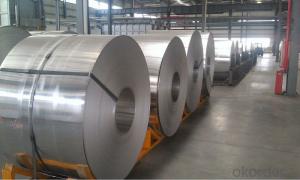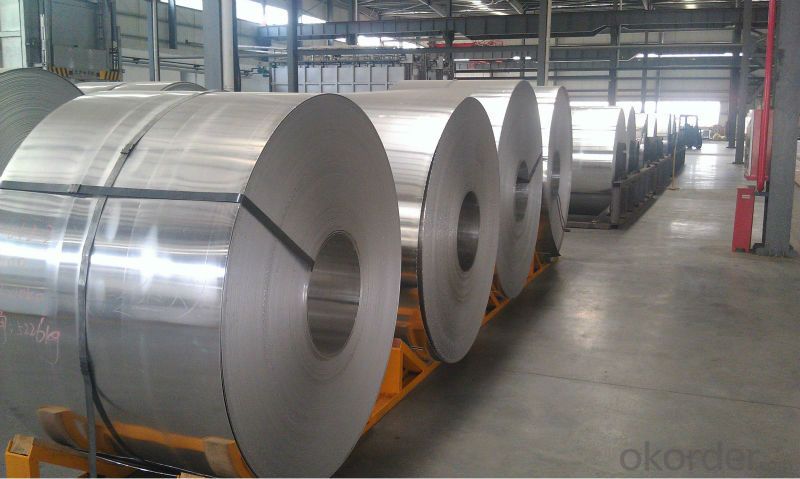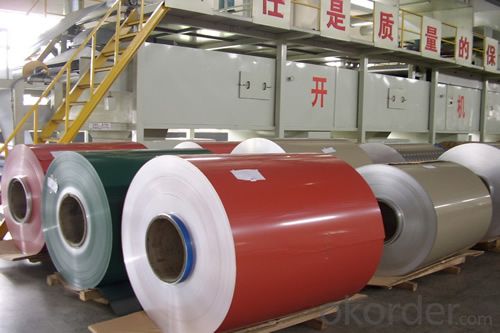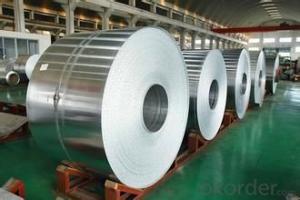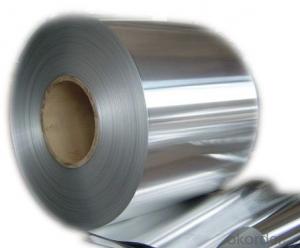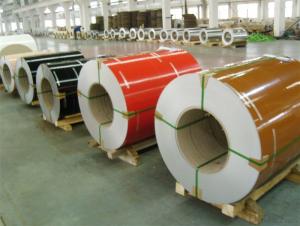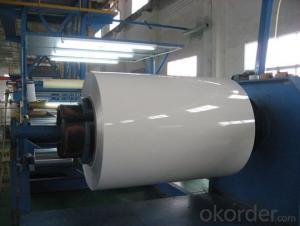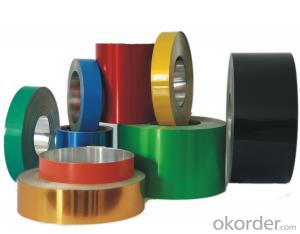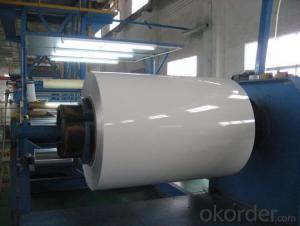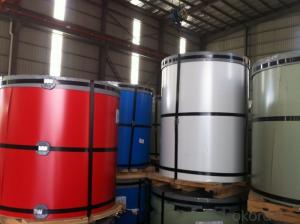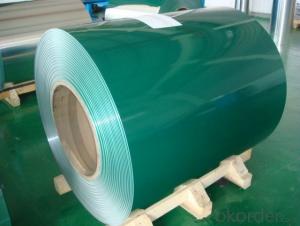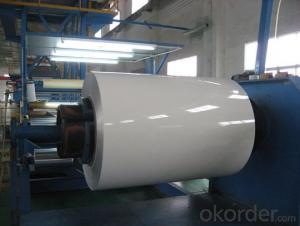1100 Aluminum Coil RAL 2001 PE 25 Micros Coated Aluminium Coil
- Loading Port:
- Shanghai
- Payment Terms:
- TT OR LC
- Min Order Qty:
- 5 m.t.
- Supply Capability:
- 50000 m.t./month
OKorder Service Pledge
OKorder Financial Service
You Might Also Like
Specification
Description
Grade
| 1000 Series: 1050 1060 1070 1100 1200 1235 etc. 3000 Series: 3003 3004 3005 3104 3105 3A21 etc. 5000 Series: 5005 5052 5083 5086 5154 5182 5251 5754 etc. 6000 Series: 6061 6063 6082 6A02 etc. 8000 Series: 8006 8011 8079 etc. |
Thickness | 0.05~10mm |
Width | <1600mm |
Color | Metallic, Solid, RAL or by customer requirements |
Coating paint: | PVDF(Polyvinylidene Fluoride), PE(Polyester ) |
Coating thickness | as per customer’s request |
Gloss | 10-90%(EN ISO-2813:1994) |
Total coating thick | Polyester18~27micron(EN ISO-2360:1995) PVDF27 ~35micron(EN ISO-2360:1995) |
Coating hardness | 2H |
Protective film | PVC film, Colorless transparent or White-black |
Adhesion | 5B (EN ISO-2409:1994) |
Impact resistance | No cracking and peeling (A.S.T.M D2794-1993) |
Flexibility (T-bend) | 0T- 2T |
Temper | H16, H18, H24, H26, H26 |
Certification | ISO9001:2000, CE, SGS |
Coil's standard diameter | 1100mm |
Inner Diameter | 405mm/505mm |
Coil's standard weight | 2000kgs |
Payment | L/C ,T/T |

PE and PVDF Painting
Polyester Coatings (PE)
PE (polyester) coatings exhibit an excellent combination of hardness, flexibility, flow, appearance, and superior resistance to dirt retention in indoor and outdoor applications. These coatings are highly resistant to abrasion, metal marking, staining, and marring, and require minimal maintenance. Glazetech uses polyester paints which provide excellent colour and gloss retention properties.
Polyvinylidene Fluoride Coatings (PVDF)
PVDF (polyvinylidene fluoride) is a chemical resistant thick film barrier coating commonly used in architectural applications where both excellent appearance and substrate protection must be maintained over a long period of time. This coating is unaffected by most chemicals and solvents and has excellent wear and abrasion resistance. PVDF also has a high dielectric strength, excellent resistance to weathering and the ability to self extinguish.
FAQ
--Q: Do you provide free samples?
--A: Yes, free samples will be sent to you on freight at destination.
--Q: What are your payment terms?
--A: We accept L/C, T/T.
--Q: What kinds of alloy can you supply?
--A: 1000 series: 1050, 1060, 1070, 1100, 1145, 1200
3000 series: 3003, 3004, 3105, 3104
5000 series: 5052, 5083, 5754, 5182
6000 series: 6061, 6063, 6062, 6063
8000 series: 8011, 8021
--Q: What kinds of temper can you supply?
--A: O-H112: O,H12,H14,H16,H18,H22,H24,H26,H,32,H34,H111,H112
T3, T4, T6
- Q: What are the production processes of aluminum coil and what are the functions of various industrial furnaces in the production of aluminum? The more detailed, the better. Thank you! Points!
- General steps are as follows: melting - hot rolling - cold rolling - annealing – shearing – straightening – punching
- Q: What are the potential applications of coil-brushed aluminum coils?
- Coil-brushed aluminum coils have a range of potential applications due to their unique properties. They can be used in interior design, architecture, automotive industry, appliances, electronics, and even in the manufacturing of furniture and decorative items. The brushed texture on the surface of the aluminum adds an aesthetic appeal and can be employed for creating modern, sleek, and sophisticated designs. Additionally, the durability and corrosion resistance of aluminum make it suitable for outdoor applications such as signage and cladding.
- Q: also, can aluminum become oxidized when secured down with metal nuts and bolts vice stainless steel nuts and bolts?
- there is not any way which you will develop right into a mermaid.. you may now have gills surgically put in on your physique... yet as for the rest that is not any longer achievable for there are nevertheless issues that for the period of common terms nature ought to do... And shall we no longer forget that guy-type and mermaids have been enemies for hundreds of years... and you need to get caught in some fisherman internet and land up as dogs nutrition.... Or a attempt subject in some international places laboratory And ingesting uncooked sea-nutrition for the the remainder of your organic life my no longer be your component........ yet on no account the fewer solid success in having your dream come actual.......................
- Q: What are the proper storage methods to maintain the quality of aluminum coil for future use?
- <p>To store aluminum coil for future use, ensure it is kept in a cool, dry place away from direct sunlight and moisture. Stack the coils on flat, level surfaces with appropriate padding to prevent damage. Avoid stacking with other metals to prevent galvanic corrosion. Use clean, dry hands or gloves when handling to prevent oil and dirt from contaminating the surface. Store in a controlled environment with a relative humidity below 65% and a temperature between 32掳F to 90掳F (0掳C to 32掳C). Regularly inspect the coils for any signs of corrosion or damage.</p>
- Q: This question asks about the environmental friendliness of aluminum coils.
- <p>Aluminum coils are considered environmentally friendly for several reasons. They are highly recyclable, with the recycling process requiring significantly less energy compared to producing new aluminum. This reduces greenhouse gas emissions and conserves resources. Additionally, aluminum is a non-toxic material that does not leach harmful substances into the environment. However, the environmental impact also depends on the production process, which can consume energy and generate emissions. Overall, when properly recycled, aluminum coils have a lower environmental footprint than many other materials.</p>
- Q: What are the different coil uncoiling options for aluminum coils?
- There are several coil uncoiling options for aluminum coils, including manual uncoiling, mechanical uncoiling, and motorized uncoiling. Manual uncoiling involves manually unwinding the coil by hand, while mechanical uncoiling utilizes a mechanical device such as a uncoiler or decoiler to unwind the coil. Motorized uncoiling, on the other hand, involves using a motorized system to unwind and feed the coil. Each option has its own benefits and is chosen based on the specific requirements and volume of the aluminum coil being processed.
- Q: How much does it cost to use fluorocarbon paint for aluminum coil roller coating?
- Fluorocarbon paint can be divided into fluorocarbon paint for exterior wall, aluminum fluorocarbon paint, metal fluorocarbon paint and steel structure fluorocarbon paint according to usages. It can also be divided into national standard product and non-national standard product according to industrial standards.
- Q: How are aluminum coils used in the packaging industry?
- The packaging industry relies heavily on aluminum coils due to their exceptional properties and versatility. These coils are extensively employed in the creation of diverse packaging materials. A primary use of aluminum coils in the packaging industry is the production of aluminum foil. This thin sheet of aluminum is utilized for numerous packaging applications. Its flexibility, light weight, and outstanding barrier properties make it perfect for preserving the freshness, taste, and quality of food products. Aluminum foil is commonly employed for wrapping food items like sandwiches, snacks, and leftovers. It is also used to package pharmaceutical products, cosmetics, and other consumer goods. Additionally, aluminum coils are employed to manufacture aluminum cans, which are widely used to package beverages such as soda, beer, and energy drinks. Aluminum cans are lightweight, durable, and offer excellent protection against light, oxygen, and moisture. They also have a longer shelf life compared to other packaging materials, ensuring the preservation of taste and quality. Furthermore, aluminum coils are employed in the production of blister packs, which find common use in the pharmaceutical industry. Blister packs consist of a plastic sheet with individual compartments for medications or capsules. The aluminum coil is laminated onto the plastic sheet, providing a barrier against light, moisture, and oxygen, ensuring the stability and integrity of medications. Moreover, aluminum coils are utilized in the production of flexible packaging materials such as pouches, sachets, and bags. These packaging materials are widely used for various products, including snacks, pet food, coffee, and personal care items. Aluminum coils are laminated onto plastic films to create a barrier against moisture, oxygen, and light, thus extending the shelf life of the packaged products. In conclusion, aluminum coils are essential in the packaging industry, offering numerous benefits such as light weight, durability, barrier properties, and versatility. From aluminum foil to cans, blister packs to flexible packaging materials, these coils are crucial for preserving the freshness, taste, and quality of various products.
- Q: What are the various applications and purposes for which aluminum coils are utilized?
- <p>Aluminum coils have a wide range of applications due to their lightweight, corrosion resistance, and malleability. They are commonly used in construction for roofing and siding, in the automotive industry for car parts and body panels, in the packaging industry for cans and foils, and in electrical applications for wiring and transformers. Aluminum coils are also used in the manufacturing of heat exchangers, cooking utensils, and various consumer products. Their versatility makes them an essential material in many industries.</p>
- Q: What precautions should be taken when operating a welding torch on aluminum coils to ensure safety?
- <p>When using a welding torch with aluminum coils, it's crucial to follow safety measures to prevent accidents and ensure a safe working environment. Always wear appropriate personal protective equipment (PPE), including heat-resistant gloves, safety glasses, and a welding helmet. Ensure the work area is well-ventilated to avoid inhaling fumes. Use a backdraft hood or fume extraction system to capture and remove welding fumes. Keep the work area clean and free of flammable materials. Regularly inspect the torch for any damage or wear. Use the correct type of welding rod for aluminum and ensure the gas supply is compatible with aluminum welding. Never leave a lit torch unattended and always follow the manufacturer's guidelines for safe operation.</p>
Send your message to us
1100 Aluminum Coil RAL 2001 PE 25 Micros Coated Aluminium Coil
- Loading Port:
- Shanghai
- Payment Terms:
- TT OR LC
- Min Order Qty:
- 5 m.t.
- Supply Capability:
- 50000 m.t./month
OKorder Service Pledge
OKorder Financial Service
Similar products
Hot products
Hot Searches
Related keywords
